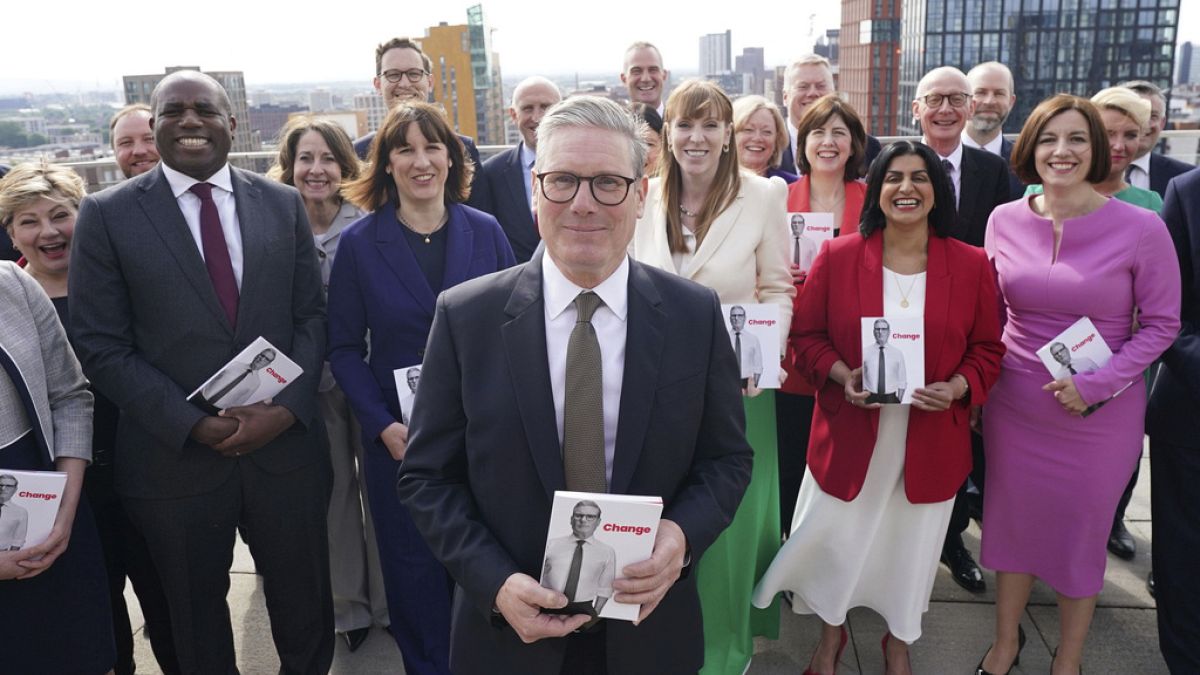Labour’s leader Kier Starmer has ruled out any radical re-haul of the UK-EU relationships but has made clear his distaste for Boris Johnson’s post-Brexit arrangements.
Labour and its current leader, Keir Starmer, could be set to lead the United Kingdom after 14 years in opposition — if the polls hold.
The opposition centre-left party is well ahead of the ruling Conservatives in the polls for next week’s general election in the UK, garnering 36% of support over the Tories’ 20%, according to YouGov’s latest poll.
For many in Brussels, the rise in Labour’s popularity has brought on a series of questions, including whether the party could rethink its 2016 referendum-confirmed decision to leave the EU.
Starmer, a risk-averse former barrister, has ruled out any radical transformation of the UK-EU relationship — namely, the UK’s return to the fold — but has advocated for strengthening ties in trade and security.
Brexit U-turn not on the cards
After the UK officially departed from the bloc in 2020, those who believe a Labour government could begin to unpick Brexit would be mistaken.
Despite campaigning to remain in the EU, Starmer has publicly hardened his approach and ruled out a return to the single market or customs union, therefore rejecting any pledges to fully restore the freedom of movement between the UK and Europe back to pre-Brexit levels.
He has also snubbed calls from within his own party by London Mayor Sadiq Khan to create a new visa deal for young workers to move between the UK and the EU for four years and re-join the Erasmus student exchange scheme.
Joël Reland from the UK in a Changing Europe think tank told Euronews that this could be a product of electoral caution, as the party tries to hold on to its majority in the polls and avoid attack from the Tories.
However, Starmer has been critical of London’s policies towards the EU, saying that the post-Brexit deal under Boris Johnson was “botched” and that the UK could do better.
His Shadow Chancellor of the Exchequer, Rachel Reeves, explained recently that the UK would seek a less “adversarial approach” to negotiations with the EU, focusing on trade arrangements in specific industries.
Labour’s electoral manifesto points to easing border checks to tackle the cost of food, helping artists tour and the mutual recognition of professional qualifications. Other proposed changes include a new veterinary agreement with the EU, hoping to improve trade.
Navigating Brussels
The catch for Starmer would be trying to weave the United Kingdom — and its economy — back into the European Union in a way that Brussels would accept while also not alienating himself from swathes of the British population who voted to leave to begin with.
“Labour is going to have to come forward with a really clear proposal, or else there’s not much incentive for the EU to even come to the negotiating table because, quite frankly, they have a long list of higher priorities,” Reland told Euronews.
Brussels officials may be sensitive to the UK cherry-picking its way back into a relationship with the EU — agreeing to deals that would benefit the UK economically yet would not normally be granted to a third country that is officially outside the union.
“The second challenge is then around the political trade-offs, because any deal is going to involve quite a large degree of alignment with EU regulations, and that comes with quite clear political risks for a Labour government,” added Roeland.
For instance, one of Brussels’ requirements is that the UK have oversight of the European Court of Justice — the supreme court of the European Union for EU law — in order to ink a new veterinary agreement, which could anger potential Eurosceptic voters.
Also, what Labour is willing to concede in future negotiations with Brussels could depend on the size of its majority if it gets into power — and the party might feel restricted in what can be negotiated based on the mandate it holds from the British public.
What happens to Ukraine?
Meanwhile, the Labour Party has clearly stated that it is as committed to NATO and defending Ukraine as its Conservative rivals.
Dr Patrick Bury, a former NATO analyst and defence and security expert, told Euronews that Labour’s approach to the military alliance will likely be one of “continuity over change”.
Labour has pledged to continue the Conservative government’s commitment to spending 2.5% of its GDP on defence. However, having inherited an economy battling high inflation, a Labour government would find itself fiscally constrained in terms of how much it can commit to defence beyond this.
Beyond committing to uphold Britain’s NATO commitment, Labour has promoted a new “security pact” with Europe, although precise details on what this may entail are vague.
This vagueness could be a deliberate means for the Labour Party to try and negotiate issues defined as security that may not otherwise be open to someone who is outside the EU architecture.
“The EU is extremely sensitive to cherry-picking (from the UK) and will quickly see through an attempt to reframe an economic issue as a security one,” commented Reland.
In its manifesto, Labour has highlighted Germany and France as two countries with which it would likely try to rebuild security and defence relationships.
“If you look at their rhetoric, there’s a lot focused on meetings and presence and public engagement. That’s really what the security pact is actually all about.”
“It’s a way of saying, look, we want to be talking to one another a lot, because that doesn’t really happen currently in the relationship. I think a lot of what they will focus on is injecting that energy and goodwill into relations,” Reland concluded.

